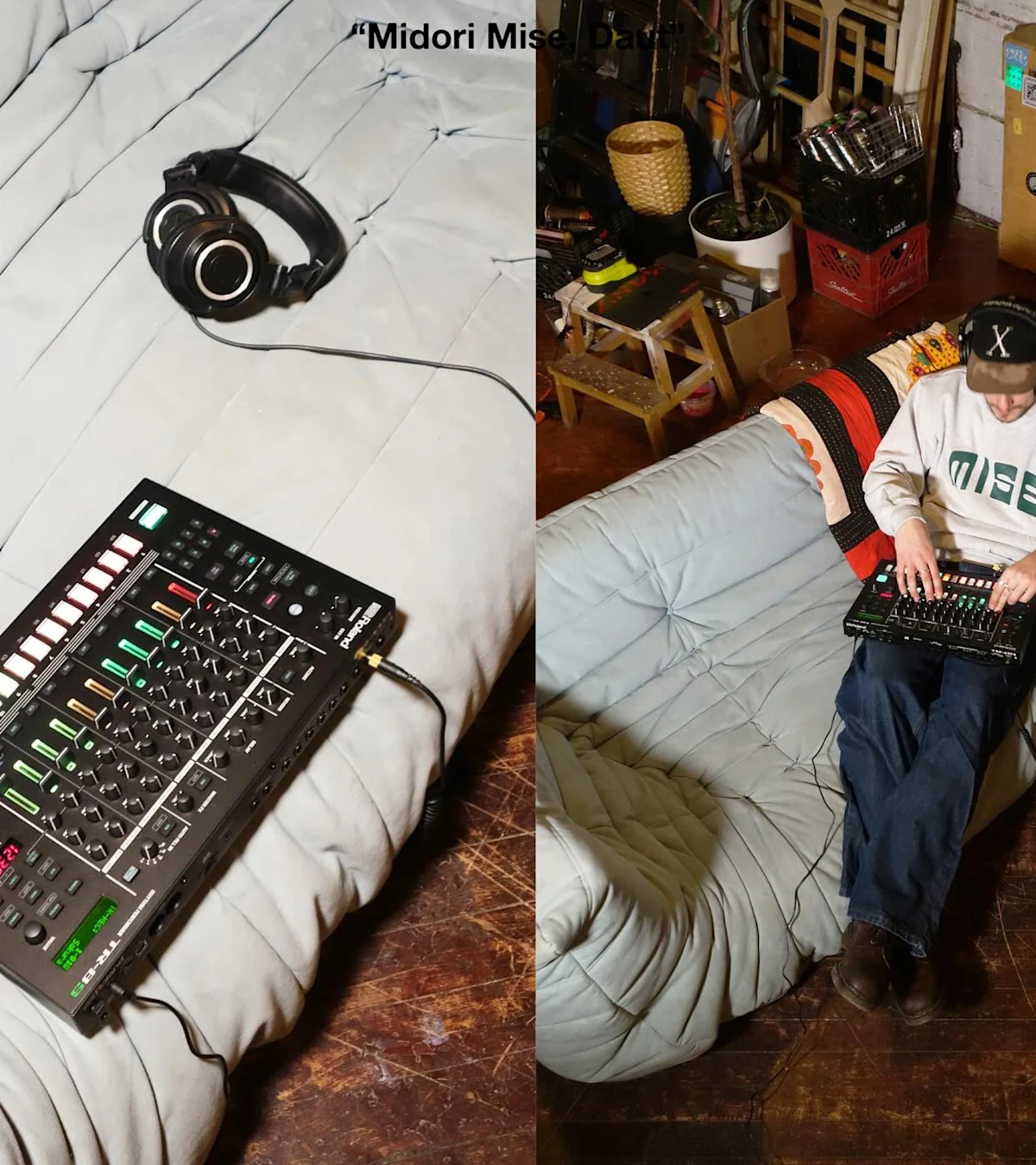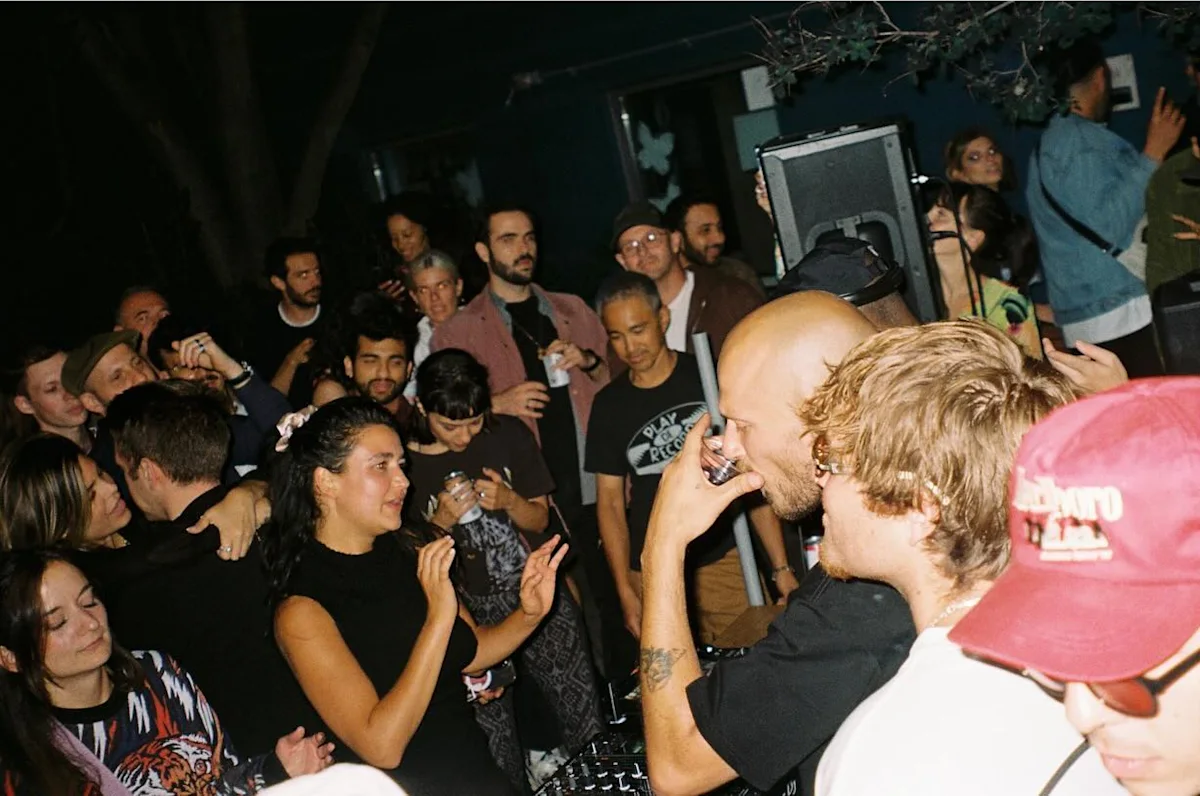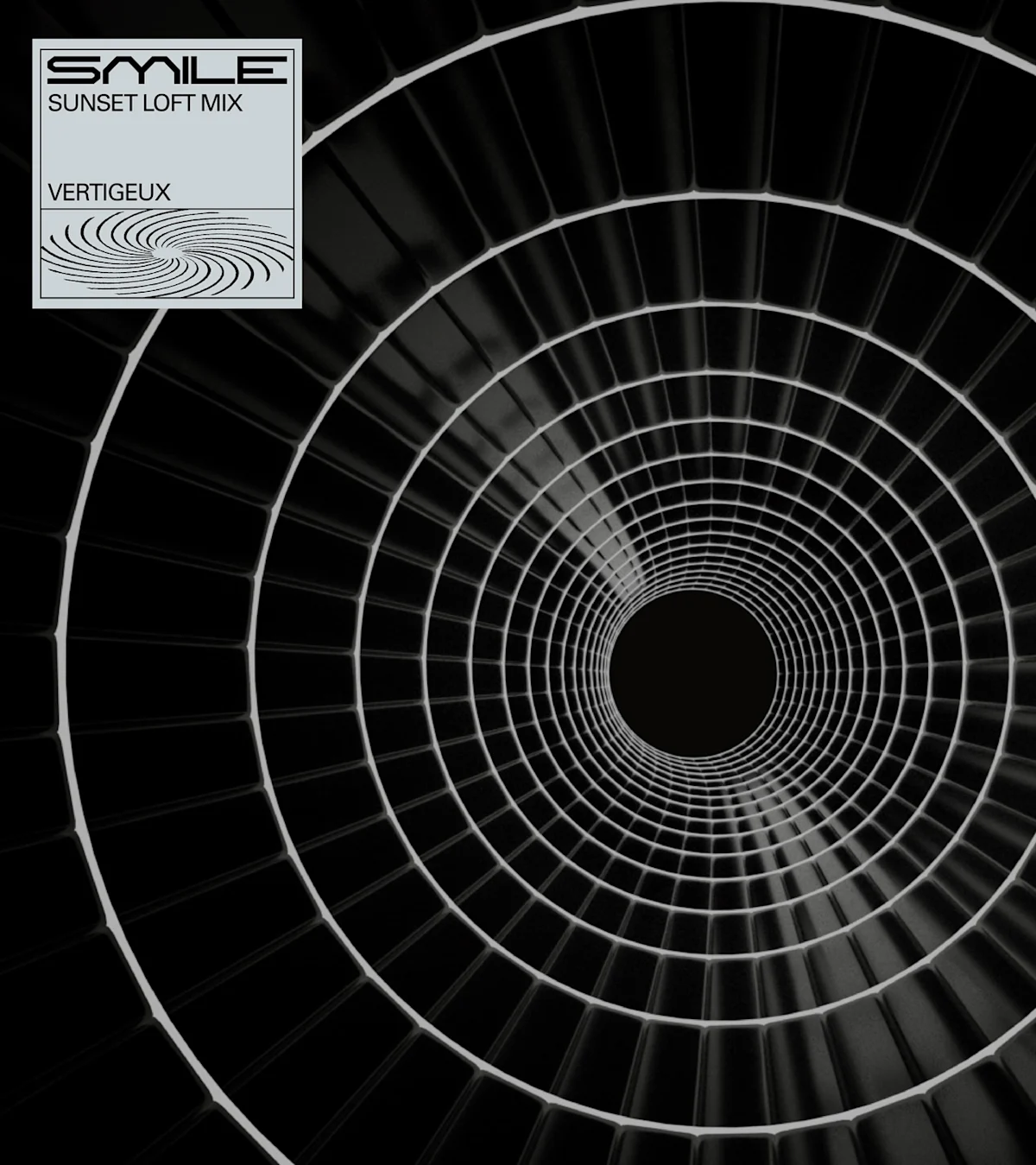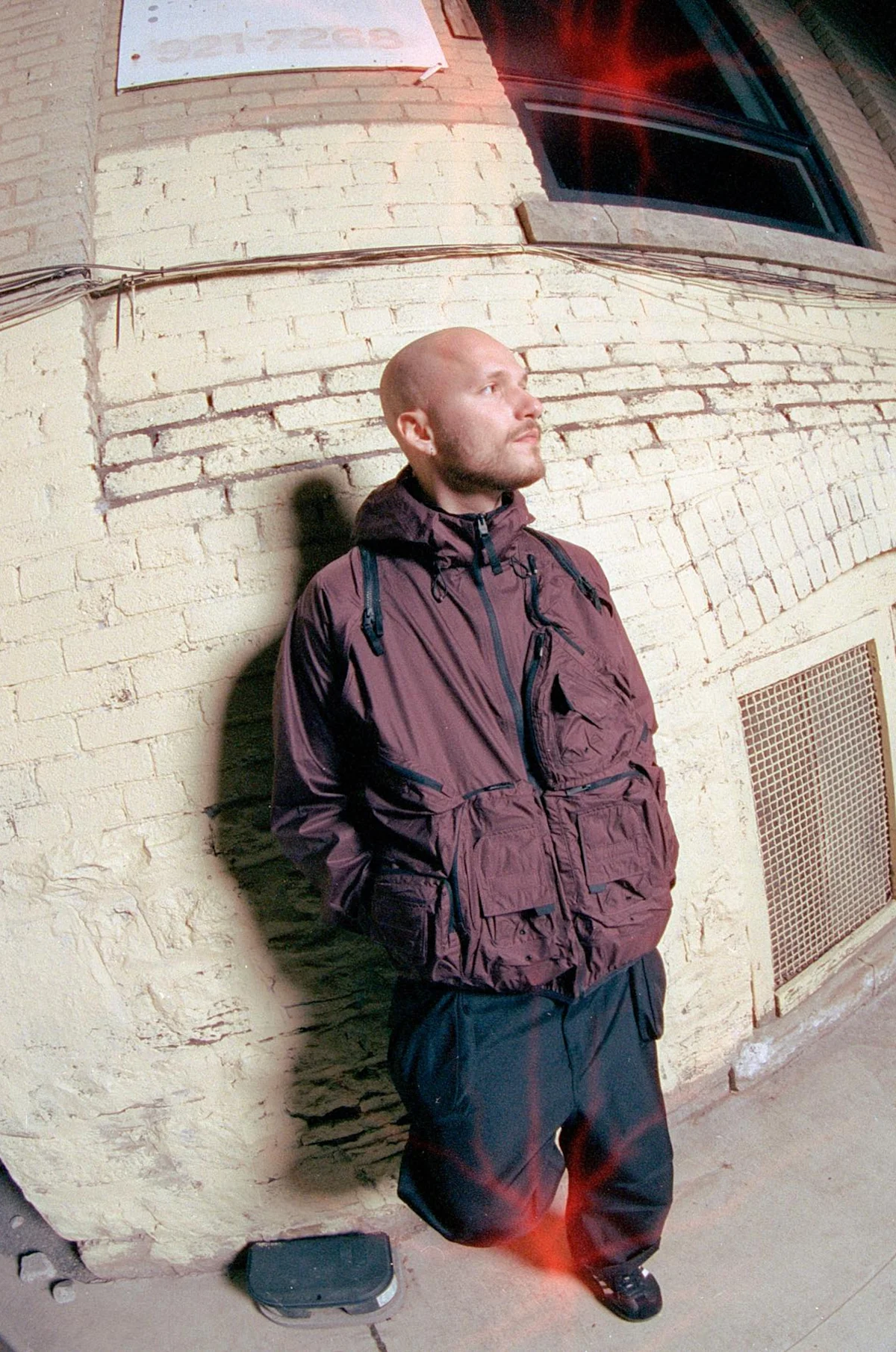Daut Berisha also known as “Vertigeux” is a music producer, DJ, and sound designer originating from Kosova. Now based in Toronto, Canada, his versatility combines fusions of dance music, hip-hop, and experimental while pushing the boundaries of sound.
I wanted to get your impressions on some words that I sort of free associated when I was listening to your mix: absorption, tactility, texture, sparse, and lush. Any of those resonate for you?
⎯⎯⎯ I resonate a lot with absorption, lush, and texture. A lot of the music that I create or that I'm really into is very textured, whether it's like a little bit of noise or vinyl grit or people speaking in the background, it just brings a whole other dimension into music where you feel like you're in a room, a place, or a scene. So I'm really into texture, lush and absorption.
How do you think that you create those feelings in your music?
⎯⎯⎯ I would say my phone recorder. When I'm out in public I like to capture ambiance on a walk or something. It instantly introduces depth. I really like to do that type of stuff to incorporate texture into my music and mixes. As for lush, I have a bit of gear in the studio, a couple of synthesizers, drum machines and whatnot, that gives a bit of a softer retro vintage synth sound that’s not as harsh, more meditative, where you're able to, let's say, play it at any hour of the day. You could put it on while cooking, or doing work, or at the club, or in the car. So something that's accepted universally.
Your music really invites the listener into a sense of space, and I wonder if that’s intentional, and if so, where it comes from? Are you interested in architecture, buildings, and space?
⎯⎯⎯ I feel like in another life, I would have loved to be an architect or something, or even a mechanical engineer. Here's the thing, when you're in a space that's properly set up, or the architecture speaks to you, it's an energy you can't explain to people. You feel like you're in a dream state. I don't even know how to explain it fully, but space definitely motivates me and inspires me a lot in my own creations. What helps me start music sometimes when I'm hitting writer's block is thinking about a specific scene, whether it's a warehouse or a jazzy lounge where the lights are low, it always guides me to finish a product that I'm working on. It's like, I'll close my eyes and envision myself in a space and ask myself, does it resonate for that space? Visual things have always guided me more.
I'm wondering where the visual side and the music side sit within your creative output and how you feel they are connected? Which came first, or did you develop those two senses together?
⎯⎯⎯ I've been making music for about ten years now and definitely started from the music space. I saw Clams Casino perform live in New York like seven years ago, and the way he incorporated audio that reacted with the visuals just left me speechless. It still resonates with me to this day. It was definitely a big source of inspiration. Since about a year ago, I've had people come on board to create visuals for me, which is great. Prior to that, I was just learning a little bit of Photoshop, or like putting together little bits and clips in DaVinci Resolve. Just enough to have a full package. I'm thankful that I'm in a position now where I'm able to pass on the visual aspects to somebody else. But as for my own personal life, I love capturing little moments, pictures and putting them up on Instagram as a collage style thing.
What's your collaborative approach? Does it evolve organically through mutual respect and appreciation?
⎯⎯⎯ I feel like it's definitely evolved organically by just being in spaces with certain individuals and resonating on things that we view in a similar way. I respect their art, they respect mine. I try not to put too much of a guideline down. Maybe here and there I might send a reference and then let them have fun with it. I work with the same guy over and over. I don't know if you know Sly, Heavy Machinery?

Can you describe what their work is like?
⎯⎯⎯So he's a 4D renderer, does a lot of commercial work and whatnot. But then his own stuff is very Brutalist, architectural, like lines and typefaces that are just really bold and simple. I really love that. I love how he places things, like ratios them, in whatever he's doing. I've been having a growing appreciation for type as of late. It’s something that I feel like I undermined or just didn't pay too much attention to for a long time. There's a lot of work that goes into fonts and placement and sizing. Definitely opened up my eyes to how much work it is.
This ongoing collaboration is kind of informing your work or your musical work in certain ways too?
⎯⎯⎯ Yeah, yeah, I would definitely say it complements what I do with the audio. I want them both to dance hand in hand. I want to give the visuals just as much power as the audio.
It sounds like when you saw Clams Casino, everything just kind of clicked for you.
⎯⎯⎯ The music is just so ethereal and chopped, and these snares that sound like they're in a garbage bin or something. Combined with these heavy visuals that were moving, whether it was like his double-C logo or something else, it was just such a euphoric experience. I'll never forget it. It's like, that's what I want to be doing. I want the visuals to hit just as hard as the audio.
What are some other musical landmarks that you would identify as inspiration for what you do?
⎯⎯⎯ One heavy one – and I actually have it on my body – is Burial’s album Untrue.
Oh, yes. I love Burial.
⎯⎯⎯ Just the way that album came together, it blows my mind. The fact that he made that album in a matter of two weeks in Soundforge, which is a bootleg software that has no grids, nothing, and the way he sampled almost every pop star and pitch-bended their voices beyond recognition. Sampling Metal Gear Solid, the video game, and all the little sonic nuances. He did an interview where he said his neighbor, who was an opera singer, sparked him to implement that into his album, where you could hear a distant singer. It kind of sounds like you're putting your ear to the wall to hear this person. That's probably my favorite body of work that's ever been put out. Burial’s Untrue. That's definitely one of my inspirations.
How old were you when you first heard it?
⎯⎯⎯ I heard it about ten years ago when I was eighteen. it just shook me to my core. I never heard anything like it. When you find, let's say, a source of something that was created and you can see how other people pulled from that to make stuff in the future, I felt like I was going backwards on the chain and found an artist that made something foundational. I felt a sense of completion. It was like, okay, I found something that speaks to me fully, that I could represent with pride. It's my favorite body of work.
Did you feel you could do this too? Was it an entrance way for your own creativity as well?
⎯⎯⎯ Oh yeah. Before I discovered that, I was down the endless loophole of trying to learn all these techniques, watch all these videos on YouTube and trying to buy endless gear. When I discovered Untrue and went on the deep dive, I was like, whoa, this guy literally just had a computer, some bootleg software that was like ten bucks and that's it. He just put his whole life story into this album. He's a video game guy. He really loves being from London, just walking through the streets at night. He's definitely educated on artists, like the people he would sample. It just made me bite my tongue and be like, there's no excuse. You could create a beautiful body of work with the fundamentals. You don't need all this extra stuff.
What were some of your early explorations of music making?
⎯⎯⎯ So for the first four years I was producing. Just producing. I wasn't even tapping into the DJ world. I was overly obsessed with just understanding production and music theory. It was like a whole new chapter in my life that fueled me till now. Just like the excitement, learning a new thing and whatnot. So for the first four years, it was strictly production, and a little sound design stuff. And then I got together with a dear friend that let me use his turntable, and it was just so fun that since then I’ve started practicing DJing more. And before you know it, understanding how to play vinyl as well. They go hand in hand. But sometimes I like to split it up, where I'm just in production mode for like a month. And then the next month, I’m strictly practicing DJing, discovering new music, trying to get that excitement.

They're equal in terms of your musical output?
⎯⎯⎯ Yes, yes. I feel like I put in the years with production and I'm at a place where I'm really happy with the stuff that I create, which I thought I would never say. But I’m feeling in a really good place right now where I'm able to just have fun, create things and kind of dance with the thought of even DJing that stuff out. The past six months for sure, I've been more honed in on production for the club, the dance floor, not as experimental. I also do a little bit of sound design work outside of DJing and production for myself, which has been a good way to make a little bit of money on the side. I recently did an installation for Nuit Blanche. I made a soundscape for this really cool installation. That was such a palate cleanser. Not like dance music. We were sourcing audio from Ethiopia and Eritrea.
Also a collaboration with other artists?
⎯⎯⎯ Yes, so a dear friend of mine, Brendan Phillips, me and him did it. We produced the audio and then we passed it on to a mastering engineer, and then it got tied in with the visual components for the installation.
That's really cool. How did something like that come about?
⎯⎯⎯ The girl that ran the installation is a good friend of my partner. She reached out to me. She was like, would you be interested in this? I've done work like this in the past for little short films, or little jingles for a commercial, but this was definitely the longest one I've done. It was an 18-minute audio file that just looped over the whole night. I'm definitely looking to do more of that on the side. Like I said, a very cool palette cleanser, and I end up figuring out solutions to my own productions by doing things in an indirect way.
I love this picture you're painting of your practice. It's really unprejudiced when it comes to discipline or medium. It’s like, if it's sound or music, you are approaching it with the same kind of openness and curiosity.
⎯⎯⎯ Yeah, yeah. I felt like I approached audio for a while in a very narrow-minded way, where it's like, I just want to make bangers and be a DJ. I wasn't thinking about anything else, but there's so many opportunities out there in multiple different facets of audio, and that's so beautiful. Down the road, I see myself composing for a docu-series or potentially a full out film, and those are the types of careers that you can work on well into your 50s and 60s, just doing it at home. So I'm really thankful with the life path that I've chosen, and there's a lot of different avenues in this field.
I wonder then, what it was like for you growing up? Were you always musically inclined? Did you have a knack for music or did you come to it later in life?
⎯⎯⎯ Ever since I was a kid, my parents always had records around the house. I was born in the 90s, so my dad would just be playing a bunch of freestyle, a little bit of disco, funk, and it was super cool growing up to that. I got introduced to rave music a little bit too, because I'm a Euro boy, I'm Albanian, and my dad would just play trancy stuff in the car. It was cool. I got put on to music I've never heard before at a young age. I owe it to my parents as well. They put me in piano lessons when I was younger. I grew up playing the drums too.
So it was very much a part of your adolescence growing up, music and musical education to some degree?
⎯⎯⎯ It was just a nice hobby. But when I turned eighteen, I'm like, I actually want to try this and put something together. Ever since then, I've had like a couple months where I don't do things and then I’m back to it. Ever since I was eighteen, I've been on this journey.
Were there other people that you knew in your life who were role models, or who were doing it alongside you?
⎯⎯⎯ I wouldn't say I had many role models. This was something that I dove into solo and had to kind of teach myself. But as the years went on, I started to resonate with certain friends and individuals, and we all learned from each other. There's a sense of accountability if they're in the same field. But for the first little bit, it was just me and I wasn't really talking about it much. Not really even talking to my family about it. I kind of just wanted to understand it before I showed them something.

You grew up in Kosovo?
⎯⎯⎯ That's where my family is from. In the 90s, when Yugoslavia split up, my parents left Kosovo. I was born in Germany, because of the wars going on in Kosovo. When I was two years old, I came here.
So you’re mostly raised in Canada?
⎯⎯⎯ Yeah, yeah. But, thankfully, my parents were able to get us going back every summer since we were kids. I got to really experience the culture and spend time with my family and really learn about my roots, which I think every person should do, if they're able to. It's a good feeling. But yeah, my parents were very young when they had me. They fled the country. I was born in a refugee camp in Germany.
Wow.
⎯⎯⎯ Yeah, we got sponsored by my mom's uncle here in Canada. We came here, lived with them for about a month till my parents were able to find a basement spot that we could live in, me and my sister.
All in Toronto?
⎯⎯⎯ Mississauga.
And you’ve been back sometimes to reconnect? Do you get to go tour there as a musician now?
⎯⎯⎯ I still have yet to fully break into that, which is okay. Two years ago, actually, I went back to play at a festival called Sunny Hill. It's Dua Lipa’s festival. She hosts this really cool festival in the capital, Pristina, where she brings a bunch of acts from out of the country. She's definitely doing something cool for our country, which I respect. That was a very cool experience. It wasn't a crazy slot or anything, but at least I got to just throw down for like an hour.
What a cool opportunity. Something you want to do more of?
⎯⎯⎯ Oh, yeah. I'm in the process right now of finalizing some releases and talking to a label in the UK. So, hopefully, that could slowly segue me over to the European market.
Very cool. And you have a party tonight, correct? How do you prepare for a set? Walk me through the process.
⎯⎯⎯ It varies from party to party, but for something like tonight, it's a place I've been wanting to play at for a while, so I want to be very intentional with every record that I play. I usually like to do a weekly dig. That's something I've been doing for years. If the weekly dig doesn't resonate with me, I like to just go into my catalog. I organize everything by genre and I like to go into each folder and pick bits and pieces that speak to me: new pieces that I'm working on, or demos that I want to test out in the club. It’s pretty straightforward. I like to just make a playlist for a given night of maybe two to three times more records than I actually need, to just feel out the vibe and see where the crowd's leaning towards.
Keep it pretty intuitive.
⎯⎯⎯ Yeah. I don't like to put an exact setlist together because when I've done that in the past, I ended up somehow messing up or not being prepared enough.
That makes a lot of sense. One thing I found so compelling in your mix was the aspects of dialogue and ambient sound, and I'm wondering what your intention is behind that and how you source those sounds?
⎯⎯⎯ I love outsourcing powerful conversations people have with one another, because I feel like, especially in this day and age with the recession we're going through and social media, a lot of people have issues with their mental health, which makes me feel really sad. I like to incorporate little bits and pieces, whether it's a mantra or a full out conversation between people. It's healing. Being able to hear even one sentence that resonates with you so heavily could make your whole day. I love to do that within my work. That's also what Burial did on Untrue. There's a lot of dialogue where it's very movie-oriented and it has a healing aspect for me; the voice, not a singing voice, but a speaking voice; a one-to-one personal disclosure.

Do you create those dialogues or are you picking them, like collaging from other sources?
⎯⎯⎯ If it's a track I'm making for a club, I like to just take bits and pieces from movies that I really like and just throw them on. But then other times I'll just have conversations with friends where I'll let them know I'm going to start recording, and then I just sprinkle that into my work. Or if I'm laying down with the person that I love and we just say something, or just laugh a little, those things make music so much more human.
I'm wondering what kind of story you try to tell in your music? Is it intuitive or is it very planned?
⎯⎯⎯ For the East Room mix, I was very intentionally thinking about creating something that people could work to or decompress to, or maybe just get up and go on a walk to. So for this one, I feel like near the end, I kind of want to just give that feeling like the time's almost over. It's time for you to just chill. I like to start off a little more groovy and then near the end indicate this mix is coming to a close versus continuing with a crescendo style. For this specific mix, the intention just worked out perfectly. Because there are other times where I like to go towards more of a crescendo. Let's say I'm opening up for someone, I want to build the room for the next person coming on. For example, tonight, I’m closing out the night, so I'm probably going to end up in that same pocket where I slow it down for the last little bit to just feel reflective and happy.
–Work Redux is a collection of mixes made to be listened to while working. We work closely with local and international DJs to assemble thoughtful music that will carry members throughout their day and introduce them to new sounds. East Room is a shared workspace company providing design-forward office solutions, authentic programming and a diverse community to established companies and enterprising freelancers. We explore art, design, music, and entrepreneurship. Visit our News & Stories page to read more.